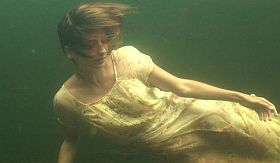… Over sådanne særprægede menneskeliv ude i det almindelige liv bygger Sønderby Jepsen i klipperummet ved optagelser han har lavet som fluen på væggen under lange samvær med den medvirkende gennem måneder og år et drama, som skildrer dette hver gang eksistentielle projekt, denne lidenskab i en kurve gennem modstand og tilbageslag hen imod en løsning, en succes, en indsigt.
TIL DØDEN OS SKILLER (2016)
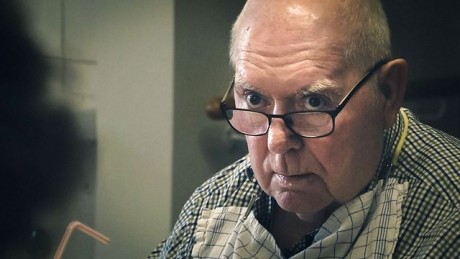
Det dokumentariske still her er uden nåde ærligt, men bag det ligger i dets filmscene også medfølelsen, som Mira Jargils og Christian Sønderby Jepsens værk, deres tv-dokumentar ikke et øjeblik forlader men langsomt undersøger og folder ud over tre aftener på TV2. Det ved Anders Kristensen, manden på fotoet godt, det er han indforstået med, han lægger alle sine muligheder for sprogets præcision ind i sine replikker og livsbeskrivelser. Han ved også godt at han skal drikke med sugerør og mades med et viskestykke under hagen resten af sin tid, men det er han imidlertid ikke indforstået med, ikke endnu. Resignationen ligger og venter, men han er ikke nået til den, han vil ikke skilles. Det er hustruen imidlertid ved at være parat til. Hans flytning til plejehjemmet er nok næste gang eller næste igen ikke den midlertidige aflastning i et kort ophold, nej, det er en flytning for al tid, en adskillelse. En skilsmisse i virkeligheden.
Jargil og Sønderby Jepsen har to ledende medvirkende mere, en mand og en kvinde i samme situation. Denne mand, Vagn Nielsen er som Anders Kristensen tæt på opgivet af sin hustru, som ikke længere kan trænge igennem til hans lukkede tankeverden, ikke leve med hans svigtende hukommelse. En lang intens scene skildrer begivenheden hvor hans hånd på hans vegne nægter at skrive under på ansøgningen om en plejehjemsplads. Mildt beslutsomt skriver en datter under scenens stille, nervøse venten endelig under på hans vegne. Hans hånd har resigneret og han er skilt i virkeligheden.
Anna Bjørslev er alene i sit store hus, hendes mand er død for et år siden, hun sidder kraftesløs i sin stol, må have hjælp til alt. Flere gange gange om dagen. Døden har skilt hende fra hendes mand, hun er fri til at vente sin egen død, men er uden kræfterne ikke fri nok til selv at afgøre på hvilken måde. Hendes tre døtre tager blidt håndfast affære, overtaler hende og gennemfører først besigtigelsen af den tilbudte bolig derefter flytningen til plejehjemmet.
Instruktørerne kalder i deres synopser tv-serien entertaining og debatskabende. Sådan ser jeg den slet ikke, men måske nok som poignant som de også skriver, mest i betydningen smertefuld. Det gør bestemt ondt at se serien når den (ind imellem sit påpegende og tydeliggørende tv-pligtstof hvad der er meget af) fordyber sig i filmscenernes sarte og sjældne øjeblikke. Som når Anders Kristensen som på fotoet ser på mig med et intenst blik over brillerne, i episode 2 er på aflastning og i en kort, vemodig monolog beskriver døgnene på plejehjemmet:
Den uge jeg har været her den føles faktisk som to måneder. Der er tre værelser til dem der er herinde på aflastning og så resten her til fastboende demente. Der er en kvinde der åbner døren engang imellem. Hun gør som en hund. Hun tror hun er en hund. Der er en mand der åbner døren. Han har stråhat på og en dukke i hånden som han sidder og leger med… Du kan høre, hvad der sker… en der råber, en der skriger…
For mig har Mira Jargils og Christian Sønderby Jepsens rystende dokumentarserie frem for noget underholdende og debatskabende været et personligt alarmkald. Jeg må altså nu, i tide, ved mine sansers og lemmers fulde kraft tage det her i egen hånd, ikke vente på familiens umulige nåde, men selv og alene forberede mig på adskillelsens konsekvens, i tide selv forhandle med pårørende og sociale myndigheder, selv og alene beslutte detaljerne og få dem testamentarisk stadfæstet ved min egen hånds underskrift. Sådan må tv-serien blive et alarmkald for mange. (ABN, blogindlæg 7. februar 2016)
NATURENS UORDEN (2015)
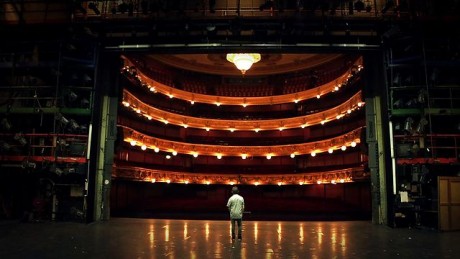
Alle Christian Sønderby Jepsens film til nu har en tydelig mand i centrum, en mand med en lidenskab, en mand med udstråling, en mand som ganske naturligt er i filmen, som er en egentlig medvirkende. Mandens lidenskab er et forehavende, et projekt: at vinde en arvesag, at vinde titlen som landets bedste fuglespotter, at opklare en kompliceret sag om et justitsmord, at få ret over sin nabo, at få samlet alle sine 12 børn i en harmoni. Over sådanne særprægede menneskeliv ude i det almindelige liv bygger Sønderby Jepsen i klipperummet ved optagelser han har lavet som fluen på væggen under lange samvær med den medvirkende gennem måneder og år et drama, som skildrer dette hver gang eksistentielle projekt, denne lidenskab i en kurve gennem modstand og tilbageslag hen imod en løsning, en succes, en indsigt.
Den medvirkende mand af den slags i den nye film Naturens Uorden er Jacob Nossell. Hans projekt er voldsomt stort, han har sat sig for at lave et ”selvbiografisk teaterstykke om normalitet, identitet og meningen med livet”, som det i begyndelsen af filmen skrives hvidt på sort på et skilt, og få det sat op på Det kongelige Teater. Sønderby Jepsen er steget på projektet og følger det med sit kamera og skaber sit værk om hans værk, med ham og med teaterinstruktøren Thomas Corneliussen og skuespilleren Kristoffer Fabricius (dublerer Nossell i forestillingen) som aldeles vigtige medvirkende i hovedpersonens ambitiøse forehavende.
Åbningsbilledet er præcist og smukt. Jacob Nossell står rygvendt til kameraet på den tomme scene i Det Kongelige Teater og kigger ud i den oplyste, tomme teatersal hvor han og jeg hører det publikum som han filmen igennem vil arbejde på at blive i stand til at møde. Han og jeg hører publikum klappe. Hans første replik lyder: ”Hej! Mit navn er Jacob. Når folk møder mig for første gang, så får de en instinktiv impuls til enten at flygte fra mig eller også slå mig ihjel. Så vi skal nok få en rigtig hyggelig aften i aften.” Musikken sætter ind, det er filmmusik til en stor film. Ingen tvivl om det, jeg er tryg.
Så tager Nossell fat på researchen, han tager det journalistiske arbejde alvorligt, tager fagets metode på sig, samler materiale til teaterstykket og til filmen, til sit manuskript i samarbejde med Thomas Corneliusssen og til sit treatment sammen med Christian Sønderby Jepsen. Han besøger og interviewer med sig selv som både undersøgende journalist og objekt for undersøgelsen en filosof, en neurolog, en dagbladsredaktør, en personalechef på DR, ”nu er jeg rigtig vred” siger Nossell da han hurtigt fjerner sig fra oplevelsen, fra begrundelsen for at han ikke kan komme i praktik der, han ser jo mærkelig ud og han taler så højt, hvad han ikke selv ved, med sit talebesvær ikke selv kan regulere. Derefter er der så resarch i en medicinhistorisk museumssamling med mennesker i sprit, med misfostre fra dengang, med konkrete belæg for hvad der tidligere ansås for normalt. Og oplevelsen sætter sig som idé til filmens plakat.
Det er barske møder. Der er især et med en antropolog, en forsker som er sikker på at om nogle år vil unormalitet blive sorteret fra, handicaps som spastisk lammelse i hvert fald, og der er igen en ansættelsessamtale, denne gang med Miki Mistrata på Ekstra Bladet som placerer Jacob Nossell midt i en Gaussk kurve over journalistisk talent tegnet i luften med hånden, placerer ham midt i den store masse af almindelighed og normalitet, og slår fast at han bestemt ikke er noget stort journalistisk talent. End ikke en 14 dages praktikplads kan han få på hans avis.
Jeg derimod som tilskuer glæder mig i en række oplevelser i dette, er glad for at møderne med vidnerne er er skildret som samvær, klippet som samvær, samlet i naturlige sekvenser som begivenheder på Jacob Nossells vandring fra sted til sted, altid rygvendt, kameraet er lige bag ham, følger ham. Jeg fryder mig over denne elegante sammenføjning af to, både ret ens og temmelig forskellige projekter, skuespillet og dokumentarfilmen. Denne sammenføjning er selve rammen om fortællingen idet manuskriptskrivningen i teatret er fælles og de samtidige forunderøgelser er fælles, og det bliver derefter filmens byggesten og handling.
Der er meget mere at glæde sig over i Christian Sønderby Jepsens nye film. Der er først og fremmest gjort plads til pausen som bliver til en meget lang scene fuld af betydninger. Efter samtalen med neurologen forklarer denne rolige, kompetente mand Nossell, at scanningen viser at det slet ikke står så galt til med hjernen, skaden som er skyld i talevanskelighederne og det motoriske besvær er ikke voldsom og det meste er normalt. Og Nossell er lykkelig. Sønderby Jepsen benytter med det samme situationen til fra bag kameraet at spørge: ”Ville du gerne have et andet liv end det du har lige nu?” Jacob Nossell går helt i stå, men hans ansigtsudtryks kadence af glidende følelses- og overvejelsesskift fylder scenen i meget lang tid, og jeg holder vejret til svaret tøvende kommer. Det er en meget smuk filmscene. Et andet eksempel er optagelsen fra en prøve på en scene i teaterforestillingen. Nossell sidder ved sit skrivebord bag sin computer midt på det ellers tomme scenegulv. Thomas Corneliussen sidder alene på en af stolene nede i salen. Jacob Nossell skriver på et digt til sit ufødte barn og læser det med sin vaklende stemme højt undervejs. Der er mange pauser på grund af mange følelsers ankomst til sindet: er dette en mulighed eller er det endnu en dagdrøm? Ler han? Græder han? Er det rollens mimik eller er det hans? Jeg ved det ikke. Filmens inderste nerve svinger her som et eftertankens pendul: person / karakter… teater / film… forestilling / virkelighed… Der er mange pauser, lange. Og scenen er lang. Kameraet svigter ikke, der klippes ikke væk. Jeg har god tid. Det er en god tekst og det er en meget meget smuk filmscene.
Naturens uorden er en forbilledlig dokumentarfilm med en ikke et øjeblik svigtende hovedperson og to andre gennemgående præstationer, en teaterinstruktør og en skuespiller, på samme måde konstant gribende personskildringer. Dertil en uafbrudt række præcise scenerækker med fascinerende eksperter og andre fagfolk som Nossell i filmens handling opsøger. Alle disse er instrueret og klippet frem til fuld prægnans og autenticitet samt konstant nærvær. Sådan ser en film ud når et konsekvent arbejde med det iagttagende kameras metode lykkes og afklaret resulterer i en yderst kompliceret historie, en biografi over en skrøbeligt sammensat person og en undersøgelse af eksistensens betingelser og bliver en både munter og dybt rystende skildring af dette udsatte, følsomme og konstant eftertænksomme menneske.
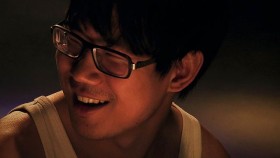
Jacob Nossell
SYNOPSIS
Science is bringing us closer to creating the perfect human being. But what are the consequences of defying natural evolution? Recent advances in medical science bring us closer to the prospect of creating a genetically perfect and flawless human existence. An unborn human life can be screened and influenced in so many different ways. Sperm banks offer to determine the sex, eye color and blood type of your dream child. Nuchal scans and genetic tests allow us to reject defects before it is too late. The goal is to give a worthwhile and healthy life to as many people as possible. A life without disabilities. Or rather – a normal life.
24-year-old Jacob Nossell is really bright, but he does not fit the typical idea of a dream child or the perfect life. Jacob suffers from cerebral palsy, a congenital physical disability. In addition to affecting his speech, it causes muscle cramps and stiffness. His words run together when he speaks and his movements are limited. With a normal intellect in a weakened body Jacob Nossell is the embodiment of the dilemma of normality – e is too disabled to be truly accepted by society and too normal to accept his own fate. Therefore Jacob has decided to stage a performance at the Royal Danish Theatre (Human Phase-out), and put matters straight once and for all. He will do away with normality as defined by the majority.
The film Natural disorder, together with Jacob, examines, tests and challenges modern society’s concept of normality. The film follows the development of Jacob’s performance from his collection of empirical data to the premiere at the Royal Theatre. But the film also witnesses Jacob’s inner musings during the process and reaches the point where we get to know his most personal thoughts. The theatrical process will be combined with an independent cinematic layer that visually reflects on future scenarios concerning normality and disability. A “fable of consequences” spiralling from the fact that it is scientifically possible today to design the people of tomorrow. The unwanted can be eliminated. We take a close look at the near future, where someone like Jacob only exists in a glass jar in a scientific museum. The aim is to make a moving film describing the ethical crossroads in human evolution anno 2013. (CPHDOX, Forum Projects 2013)
BLODETS BÅND (2013)
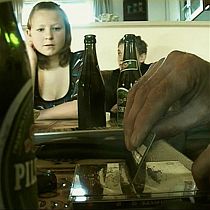
Jeg kan faktisk rigtig godt lide den her synopsis, som er sendt ud med pressematerialet til næste film i DOX:BIO: ”Svend har 16 børn. De fire yngste har han sammen med Gitte, som han netop er ved at blive skilt fra efter 28 års turbulent ægteskab. Samtidig har Svend og Gittes yngste datter, Christina, besluttet sig for at flytte hjemmefra. Men opbruddet i familien åbner en byge af spørgsmål – især for Christina, som er på vej ind i voksenlivet uden rigtig at kunne huske noget fra sin barndom. Christina vil for eksempel gerne vide, hvorfor hun og hendes tre hel-søskende blev tvangsfjernet, da de var små. Men Svend og Gitte lider af en slags kollektiv hukommelsessvigt og er ude af stand til at give et fornuftigt svar. De mener begge at tvangsfjernelsen blev iværksat på falske anmeldelser fra et nært familiemedlem.
For at hjælpe sin datter – og sin egen hukommelse på gled – beslutter Svend sig for at søge aktindsigt hos kommunen. Ved at læse dokumenterne fra dengang er han overbevist om, at han én gang for alle kan bevise overfor Christina og resten af verden, at tvangsfjernelsen var en fejl.
Og en dag kommer posten så med en meget stor kasse fyldt med sagens akter om Svend og hans mange børn. Sammen med Christina og hendes søster Michelle graver Svend sig ned i den fortid, som ingen rigtig kan huske – og de tre kommer ud på en rejse, som er alt andet end køn.”
Det ser ud til, at Sønderby Jepsen fortsætter sit projekt med familieundersøgelser. Den seneste var bestemt også alt andet end køn, men tilføjede jo den nøgne sociale undersøgelse noget. Jeg må nu kigge nøje efter, hvad det noget er. For det er det, som bevæger mig til at blive i hans film, som han laver sammen med andre, denne gang igen en journalist, som i den vellykkede Dømt for terror, 2010, han lavede sammen med erfarne Miki Mistrati og også da med Helle Faber som producer. Her er det nyuddannede journalist Pernille Bervald Jørgensen, som er medinstruktør. Hun har researchet materialet omhyggeligt, og hun har fulgt de medvirkende i flere år og lavet optagelser, det er grundigt, det her. Og hertil kommer så dette noget, som må være det, Sønderby Jepsen tilføjer. Jeg tør ikke skrive filmkunst, så det lader jeg være med…
Filmen har premiere i HADSUND BIO 4. juni og kan den 5. juni ses ved simultane visninger i en lang række biografer, de fleste steder dog kun den ene gang. (ABN, blogindlæg 25. maj 2013)
ETIK
Vi har set mange tv-programmer om børn, der er tvangsfjernede. Vi har set masser af programmer om børn, hvis opvækst blev mere eller mindre ødelagt af deres fars eller mors, eller begges alkoholisme. I de fleste tilfælde har det været programmer, hvor voksne ser tilbage på deres barndom. De fleste af os har haft alkoholikere i vor omgangskreds eller familie. Det har givet sår på sjælen.
I den forstand er Blodets bånd anderledes. Den foregår ikke i et tilbageblik, den foregår her og nu, hvor Svend Åge Hansens to døtre Christina og Michelle, og til dels sønnen Daniel, er i gang med at få et godt forhold til deres far, som de elsker på trods af en barndom i et voldeligt alkoholhelvede, hvor de blev tvangsfjernet fra faren og moren Gitte, som også spiller en væsentlig rolle i filmen. Det fjerde barn har Svend Åge og Gitte ikke kontakt med og resten af de 16 børn (!), som Svend Åge har, medvirker ikke og deres ansigter er sløret i filmens åbningssekvens, hvor en familietavle omkring Svend Åge er konstrueret.
Adskiller filmen sig så fra tv-programmerne? Egentlig ikke, for den holder ikke fortællemæssigt, hvad den lover og er i mange henseender mere et tv-program end en film. (Skuffende når man tænker på Sønderby Jepsens ”Testamentet”, der har et naturligt flow). Tidligt i filmen introduceres papkassen, sagsakterne, de mange sider, som der fra myndighedernes side er skrevet om Svend Åge og hans svigt af børnene. For hvert af børnene er der en sagsmappe, og vi ser hovedpersonen og hans døtre læse i papirerne. Det passer ikke, hvad der står, siger Svend Åge, der ikke kan huske noget, ligesom moren til kameraet siger, at hun ikke kan huske, at han har banket hende. Papkassen og dens dokumenterende indhold introduceres altså, men den bliver ikke brugt til noget. På almindelig tv-vis bliver der gang på gang fokuseret på nogle sætninger i sagspapirerne, disse bliver læst op for vores skyld, til os seere, for de involverede bliver sætningerne aldrig læst op, vi får ikke deres kommentarer, blot konklusionerne, at børnene blev tvangsfjernet – og så ser vi plejeforældrene i et sløret billede. Jo, børnene siger, at det er ”systemets skyld” og Svend Åge mener at tvangsfjernelsen fastholdt ham i misbruget. Systemet introduceres – men der er på intet tidspunkt i filmen tale om at diskutere om der fra myndighedernes skyld er begået fejl.
Instruktørerne kæmper en kamp for at gøre Svend Åge til en sympatisk figur. De er til stede ved fødselsdage, hvor han erklærer sin kærlighed til sine børn og stiller sig op på stolen for at synge ”Kender I Svend Åge”, han er en karismatisk sjuft, men ”en flink fyr” som nogle uidentificerede stemmer på lydsiden i filmens start, Hadsund-boere er det vel, det er Svend Åge ikke, selvom han gør, hvad han kan for at give det indtryk. Scenerne med børnene har en ægthed over sig, hvorimod moren nærmest bliver skurken i fortællingen. Hun gjorde ikke noget for at standse volden, hun holdt op med at drikke, siger hun, kan intet huske, bliver nærmest ”dømt” af børnene. Og filmens instruktører giver hende heller ikke mange chancer ved demonstrativt at bringe en sekvens, hvor hun danser med en mand, der falder om på gulvet, skidefuld. Fik I den seere, hun fortsætter i samme skure!
Hun virker medicineret og omkring hendes figur, akkurat som omkring mange scener i filmen, rejser der sig et væld af etiske spørgsmål. Hvorfor lagde filmholdet ikke kameraet ned og hjalp til, da Svend Åge er ved at hamre hovedet i asfalten vaklende hjem fra værtshuset? Hvorfor skal vi se Daniel hulke hjerteskærende i scenen, hvor han ikke kan komme ind på diskoteket? Hvorfor følges der ikke op på scenen, hvor incest antydes? Hvad er meningen med den ultrakorte scene med Christina og en psykolog? Hvorfor panoreres der henover det totale rod i Christinas lejlighed, er det for at fortælle os at hun ikke har styr på sig selv og sin tilværelse?
Jeg synes at filmen har betydelige etiske problemer. Den går efter det sensationelle, også i sit presseoplæg, hvor filmen ”sælges” på at Svend Åge har 16 børn, hvilket i øvrigt overhovedet ikke er et tema i filmen. Tabloidpressen følger op, Ekstra Bladets forside fortæller, at Svend Åge drikker 40 øl om dagen og vær sikker på at samme type avis vil finde frem til Ivan, der ikke har kontakt med familien, eller til landbrugsministerens datter, som har et barn med ”sæddonor” Svend Åge. Eller, eller… Smæk for skillingen, godt stof. Svag film. (ABN, blogindlæg 9. juni 2013)
TESTAMENTET (2012)
”Der er Andreas, Christian og mig, Henrik og min far og min mor og min hustru. Alle drikker.” Det siger fortælleren. Det er altså personerne, og han er en af dem, hovedpersonen, første person, ental, og jeg er inde i et familiedrama, i gang med at lytte til og iagttage en sørgelig historie, og det er disse mennesker, jeg skal være sammen med en film lang. Jeg har problemer med at holde mig fast, for jeg kan ikke holde med, ikke identificere mig, ikke forelske mig, jeg kan ikke holde det ud. Jeg stødes fra, hvor jeg skulle trækkes ind og opsluges. Og jeg kan ikke bare afvise filmen, jeg får mistanke til mig selv, til mine evner til at udfylde min rolle, min opgave. Den at være publikum, som her viser sig som et ansvar. Først og fremmest gæstens ansvar, jeg skal være høflig og forstående og accepterende, jeg er i et fremmed land, hos et besynderligt folk, som opfører sig særegent, som taler et anderledes sprog. Men jeg er anfægtet og jeg kommer i tvivl. Jeg holder filmen ude fra mig, undrende.
Jeg er ikke optaget af hovedpersonens projekt, jeg er ikke optaget af instruktørens projekt. Jeg kan ikke lide nogen, fascineres ikke af nogen. Jeg oplever mig selv som ufrivillig kigger, vil genert vende ansigtet væk, se ned i gulvet. Men jeg krummer ikke tæer, dette er fremragende film, det er autentisk, det er ægte. Sådan er det for mig nogle minutter inde i filmen, efter begravelsen, efter mødet med faren, det ubehagelige menneske, efter mødet med broren, denne mærkeligt uinteressante stakkel.
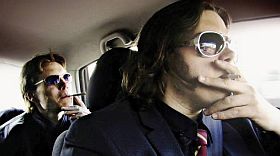
Det gamle ord anfægtelse falder mig ind, jeg er jo altså ikke rørt, bevæget, imponeret, overbevist, jeg er anfægtet af filmen, den bestrider det, som er mig, går imod min kultur, er hævet over min smag, indifferent over for min dannelse. Jeg mærker, tæppet skride under mine fødder. Filmen anfægter mig.
Verbet anfægte og substantivet anfægtelse, fortæller ordbogen, kommer af plattysk, altså nordtysk anvechten, som er sat sammen af an, som betyder til, og vechten, som betyder fægte imod. Anfægte og anfægtelse har i nudansk tre betydninger:
1) At kritisere og nægte gyldigheden af noget. For eksempel: ”Denne teori lader sig vanskeligt anfægte”. Eller advokatens ”vi anfægter retsgyldigheden af dette testamente”.
2) At påvirke på en ubehagelig måde. ”Jeg lader mig ikke anfægte af så lidt”
3) Og omvendt: at være anfægtet, det vil sige ængstet eller plaget, af tvivl. Det kan være at lide under religiøse eller moralske anfægtelser, det vil sige angreb af samvittighedsnag og tvivl. Og så vil jeg føje til, at man kan få kunstneriske anfægtelser, man kan anfægtes af et kunstværk, et maleri, en tekst, en film. Jeg tror, det kan være, hvad der er sket med mig.
Måske har jeg det med Sønderby Jepsens film, som Henrik har det med morfarens testamente. Han anfægter det, bestrider det. Den tyske advokat bruger ordet anfechten, men hun og Henrik får problemer med det: der er vist alligevel ikke grund til at bestride dets gyldighed. Henrik vender det i filmens afgørende erkendelse mod sig selv, han anfægtes.
Når jeg ser på Sønderby Jepsens værkrække bliver jeg klar over, at han vil skildre andre kulturer, ikke sin egen, eller måske derigennem sin egen, han begyndte med at lave en film om sin far og faderens nabo og deres livslange, aldrig bilagte strid og han vil lægge stoffet, han samler ind, frem uden direkte at kommentere det. Hans klip kommenterer heller ikke, han arbejder for eksempel ikke med den europæiske traditions juxtapositioner og personligt essayistiske metode, han organiserer stoffet som en dramatisk fortælling, som skrider forudsigelig frem efter den velkendte – og effektive – amerikanske model. Sønderby Jepsen tøver ikke, han er ikke i tvivl, tror jeg (som selv hele tiden er i tvivl) – han er ikke på noget tidspunkt i anfægtelse. Og han har lavet en enestående og fremragende film, så rigtig god fornøjelse. (ABN, introduktion på Den Skandinaviske Designhøjskole, 10. april 2013)
FUGLEKONGERNE (2012)
Det er fotografen på avisen i Skagen, som har fotograferet denne mand, som er den ene hovedperson i Sønderby Jepsens nye tv-dokumentar. Det låner jeg. Jeg har desværre ikke noget still fra dokumentaren. Han hedder Rolf, og han er i dag enten nr. 1 eller nr. 2 på en vigtig rangliste, listen over ornitologer, som har set flest fugle. Det er noget mere end 400 og de mest sjældne er selvfølgelig fulgt af mest prestige, en bøffeland, en citronvipstjert, en stribet græshoppesanger. Han er oppe mod en mand fra Ringkøbingegnen, Munck hedder han, og i Sønderby Jepsens film følger vi de to mænds kamp (igen to mænds rivalisering, som i ”Side by Side”) om at føje en sjælden fugl til deres liste over iagttagelser, som de vel at mærke alle har fået omhyggeligt anerkendt af organisationen, af betroede kolleger. Det er dokumentarens historie, den skildrer nogle afgørende uger, hvor Rolf søger at vippe Munck af stillingen som landets bedste fuglekender, -iagttager, -spotter.
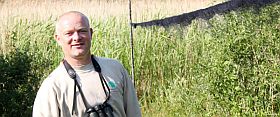
Kampen skildres mod et smukt tænkt og fotograferet bagtæppe af landskaber og figurer i gruppe. Som en trækfugleflok forbliver de uden enkeltindividualitet, dog enkelte trækkes frem for at kommentere Rolfs og Muncks forehavende, som de bedømmer overbærende, måske også på måder anerkendende, mændene på deres neddæmpede, fagorienterede måde, de få kvinder på deres… Ingen siger særligt præcist, hvad det går ud på, udtalelserne er overfladisk generelle: det er en prestigekamp, det er samlermentalitet, de er, måske i højere grad, men som alle ramt af en samlermentalitet. Rolf selv ser biologisk på det, han og Munck er begge alfahanner, siger han et sted, et kort blik fra en kvinde til ham et andet sted følger den tolkning.
Men hvad mener dokumentaren? Har den overhovedet en kerne af indsigt i det eksistentielle? Jeg er ikke sikker. Men det er tydeligt, at som sine hovedpersoner rummer dokumentaren ej heller tvivl. Den er uden undren, uden tøven, skabt i ren accept. Dens iagttagelse er båret af udelt fascination af de to mænd og deres forehavende. En speciel fascination, man som de fleste i bagtæppets figurgruppe, vil jeg tro, kan have svært ved at dele. Både mens man ser dokumentaren og bagefter. Men denne bemærkelsesværdige optagethed arbejder videre i eftertanken. Filmen sætter sine spor… (ABN, blogindlæg 15. september 2012, redigeret)
MIN FÆTTER ER PIRAT (2010)
Det kan godt være, at rammen er faderens godnathistorie for børnene, at meningen er at fortælle en moderne Robin Hood historie, som det stod i DFI pressemeddelelsen i november, eller vel nærmere berette en nutidig sørøverhistorie.
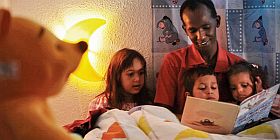
Så vidt så godt. Det kan også være, at Sønderby Jepsen med Henrik Bohn Ipsens stilrene og selvfølgelig fejlfrie billeder har villet noget særligt med en meget bevidst iscenesat dokumentarisk metode, hvad Tue Steen Müller er inde på sin anmeldelse af hans første film, ”Side by Side” (2008), hvor han i den films ”gennemførte mise-en-scene stil, i en lovende debut, erindres om Jon Bang Carlsens tidlige film.”
Men der er noget galt. Sønderby Jepsen griber tilsyneladende forkert. Han har jo været bundet af sin hovedperson, som havde historien og som kunne føre ham til dens location i Somalia. Imidlertid fungerer Farah ikke som fascinationssamlende fortæller. Han forbliver ordentlig læge og pæn skolelærer filmen igennem. Uden ridser i lakken og uden at udfordre os det allermindste. Og filmen om ham og med ham leverer ikke én ægte scene, bortset fra en tur ud til et kapret fiskefartøj, hvor han ikke er med, et besøg i et fængsel og så en kort samtale med en flok børn, dette sidste kan han! Som medvirkende i alle de andre iscenesatte afsnit er han ikke stærk nok, vil være så præcis, men er overforenklende, pædagogiserende, moraliserende.
Hans fortælling er hovedproblemet, et problem inde i selve sproget. Hans sprog er ikke kun enkelt, dagligt sprog. Det er et nedredigeret sprog forenklet så meget, at det knækker. Det bliver til en forklaring for børn, som i sin korrekthed må kede også dem. Det er værst i monologafsnittene, så snart han taler sit eget sprog i dialogerne, bliver det bedre, og som nævnt lykkes det også i spillet i et par scener. Men vide det, kan man ikke, henvist som man er til de danske undertekster, hvor oversætteren også så gerne vil forklare og forenkle. Scenerne med dialog er dertil instruerede til en tilstand, hvor nærvær og autenticitet er fordampet. Tilbage er en sær stivhed af omhyggelig illustration. (ABN, blogindlæg 5. september 2011)
DØMT FOR TERROR (2010)
Endelig fik jeg Filmsstriben til at fungere igen, endelig fik jeg mulighed for at se Mistratis m. fl.’s film, som jo har været der længe: Terrorist ved et tilfælde, 2009 og Dømt for terror, 2010. På 2009-filmen er Christian Sønderby Jepsen medinstruktør. De to film har gjort indtryk, og de har sat tanker igang. For mig på nye måder. Det er alvoren og det daglige journalistiske arbejde, jeg er blevet optaget af. Den ligetil og usentimentale vilje til en efterhånden generel sammenfatning af en voksende mistanke til vores retsstat. Og så det, at det personlige er til stede så absolut nødvendigt, men ligetil og ikke kommer i vejen for den i filmenes løb mere og mere omfattende bekymring for vores retssikkerhed.
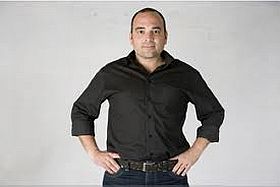
Det handler om andre, de andre helt konsekvent, men Miki Mistati, en af vore, er lige så selvfølgelig fortæller og hovedperson (FOTO). Det er så godt, for det kan han administrere så let, at man glemmer det. For det handler i allerførste omgang i “Dømt for terror” om den stakkels mand, født i Danmark, dansksproget, som formodentlig som offer for et justitsmord godt hjulpet på vej af en generel vurdering fra Glostrup Politi afgivet til kollegerne i Bosnien sidder i fængsel i Bosnien på femte år. Skønt meget i filmbilledet selv (og det er ærligt, trygt og godt) formår Mistati i sin fortælling at holde fokus på denne mands skæbne først og dernæst hen over filmens midte på terroristlovens forfærdende konsekvens for vores kultur.
De to temaer forankres i hvert sit rolige møde og interview i samtalens form. Vel at mærke møder, som holdes sammen på deres sted i den kronologi, som filmens og Mistratis opklaring afstedkommer. Sådan! Det første møde er med den fængsledes bosniske forsvarsadvokat, som låner alt sit materiale til Mistratis efterforskning og som pointe noterer, at det bosniske retssystem og dermed landets retssikkerhed er bagud i udvikling i forhold til det danske. Det andet møde er med strafferetprofessoren Vagn Greve, som brænder igennem med en interview-tilstedeværelse og foruroligende dæmpet vrede, som hæver scenen til et dokument i sig selv og som en inderste kerne i filmens dokument: “Vi skræller lag på lag af det, som er meget hårdt tilkæmpede frihedsrettigheder igennem flere hundrede år, rettigheder, som har givet garantien for, at vi har en retsstat…” (ABN, blogindlæg 17. december 2010)
SIDE BY SIDE (2008)
Around 20 minutes into this staged documentary I started to get impatient. Come on, make the story move, we got the message, the neighbours dont like each others, they dont talk, it is a silent war, where they will not fight or terrorise each other as in subjectwise similar films like the classic of Norman Maclaren. But then it takes a turn. The filmmaker asks his father, one of the neighbours, what was the biggest moment in his life. Difficult question to answer for a man, who has difficulties to express emotions, but he gives the answer. And the filmmaker goes to the neighbour to give us a positive impression of him.

We will never sit down and have coffee and pastries, says the father of the filmmaker about the conflict. More than a decade ago something happened that created a total split up between the two families. The result was that a fence grew up, a kind of no-mans land, a Berlin wall, in otherwise peaceful Western Jutland of Denmark in a town called Tarm. Where they speak a strong dialect and express a certain kind of stubbornness. Because nobody really recalls what happened, nobody knows who owes an apology.
The film is brilliant to look at, the mise-en-scène style is carried through, a promising debut, that reminds me of the early films of Jon Bang Carlsen. (Post 13-11-2008 by Tue Steen Müller)
FILMOGRAFI
Til døden os skiller, 2016. Skrevet og instueret sammen med Mira Jargil. Distribueres (streames) efter 1. marts 2016 på Filmcentralen: http://filmcentralen.dk/alle
Naturens uorden, 2015, 95 min. Manuskript, fotografi og instruktion: Christian Sønderby Jepsen, medvirkende: Jacob Yoon Egeskov Nossell, Thomas Corneliussen og Kristoffer Fabricius, klip: Rasmus Stensgaard Madsen, musik: Jonas Colstrup, produktion: Malene Flindt Pedersen, Moving Documentary, distribution: DOXBIO.
Blodets bånd, skrevet og instrueret sammen med Pernille Bervald Jørgensen, 2013, 83 min. Kan ses på Filmcentralen: http://filmcentralen.dk/alle/film/blodets-band
Fuglekongerne, 2012, 28 min. DR2.
Testamentet, 2012. Kan ses på Filmcentralen: http://filmcentralen.dk/alle/film/testamentet
Min fætter er pirat, 2010, fotografi: Henrik Bohn Ipsen, medvirkende: Nasib Farah og hans fætter Abdi, produktion: Monday Media. Distribueres på Filmstriben: link
Dømt for terror, 2010, 40 min., medinstruktører: Miki Mistrati og Nagieb Khaja, fotografi: Henrik Bohn Ipsen, klip: Ida Bregninge, producer: Helle Faber, produktion: Monday Production. Kan ses på Filmstriben: link
Side by Side, 2008, 47 min. Kan ses på Filmstriben: link



